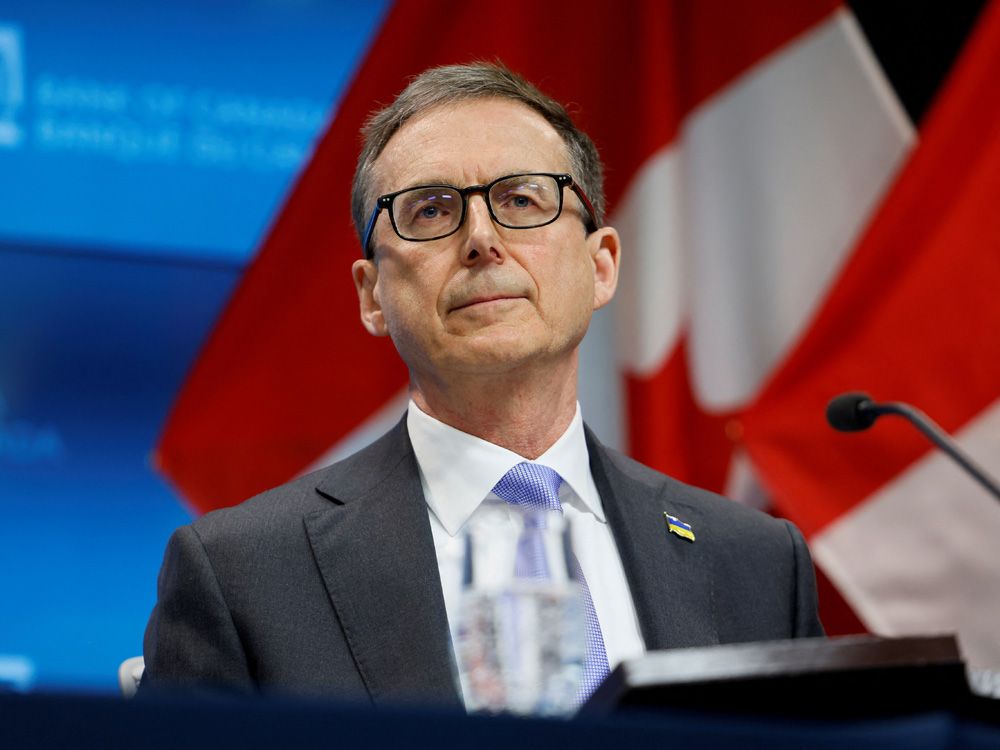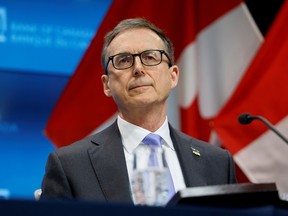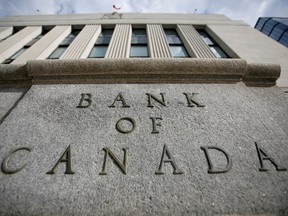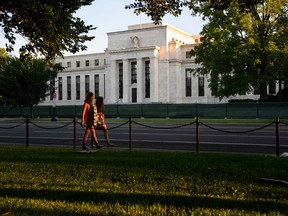Fire the central bankers for their inflation failure? Why it’s more complicated than that

Kevin Carmichael: Tiff Macklem and his advisers responded to the COVID crisis the best way they knew how

Article content
A reader sent an email recently to share his opinion about what would have happened to Bank of Canada governor Tiff Macklem if he led a private lender, and not an arm’s-length government institution: fired!
Advertisement 2
Story continues below
Article content
The ruthlessness of the private sector can be overstated. Mark Little remained CEO of Suncor Energy Inc. despite four workplace fatalities and numerous injuries over a two-year period; it took a fifth death in July to finally prompt Little’s resignation.
Article content
Still, point taken. The Bank of Canada’s primary mission is price stability, which it and the Finance Department define as keeping Statistics Canada’s consumer price index advancing at a year-over-year pace of between one per cent and three per cent by targeting the midpoint of that range.
Inflation escaped its containment zone in April 2021, and had accelerated to 4.8 per cent by December, the fastest since the Bank of Canada and the federal government agreed to set interest rates by targeting inflation in 1991. It also had been the longest stretch of three-per-cent-plus inflation in that period. Yet Macklem opted against raising the benchmark interest rate at his next scheduled opportunity in January, arguing the latest wave of COVID-19 infections represented too great a risk to the recovery to begin constraining demand by raising borrowing costs.
Advertisement 3
Story continues below
Article content
With inflation now at around eight per cent, the January policy meeting looks like a missed opportunity. “If we had known everything a year ago that we know today, yes, we probably would have started raising interest rates a little bit earlier,” Macklem said in July after raising the benchmark interest rate a full percentage point, the biggest one-time increase since 1998.
Insisting that heads should roll as punishment for human error is an ancient form of accountability. Hammurabi, the sixth Babylonian king who lived from 1810 to 1750 BC, is remembered for introducing a legal code that said any builder responsible for a structure that subsequently collapsed and killed people should be killed as punishment.
Advertisement 4
Story continues below
Article content

So, does Macklem deserve a metaphorical death? The house is still standing, although economists at Desjardins Group this week joined their counterparts at Royal Bank of Canada in predicting a recession is coming.
The cost-of-living surge is painful, and so was the stagnant recovery that followed the Great Recession, which exacerbated wealth inequality, encouraged an opioid addiction that has taken root across North America, and fuelled the political instability that now makes it so difficult to get anything done in many of the word’s leading democracies.
All those social strains were on the minds of policymakers in Canada, the United States and Europe as they confronted the COVID crisis in the spring of 2020. The objective was to end the recession as quickly as possible to avoid tail risks. That part of the mission was successful. Canada’s jobless rate is now at about five per cent, and there’s now about one unfilled position for every remaining unemployed worker, according to Statistics Canada’s latest survey of employers. In effect, every Canadian who wants a job can probably find one.
Advertisement 5
Story continues below
Article content
In hindsight, it’s obvious the Bank of Canada got the balance wrong; the benefits of a tight labour market are currently being offset by inflation that is rising faster than wages.
Macklem admitted he got it wrong during parliamentary testimony in April. That’s positive, as it shows he isn’t trapped by ideology or ego, two of the things that make humans bad at acknowledging mistakes. Contrast that with Alan Greenspan, the former United States Federal Reserve chair, whose commitment to the idea that self-interest would keep Wall Street bankers from taking dangerous risks was unshakeable, despite criticism and evidence to the contrary.

The Fed’s policies were important contributors to one of the worst economic calamities in modern history. Greenspan would eventually admit he was wrong, but it took the Great Recession to convince him. Macklem still has time to avoid the worst and appears committed to doing so. “We know our job is not done yet,” he wrote in an op-ed published in the National Post on Aug. 16. “It won’t be done until inflation gets back to the two-per-cent target.”
Advertisement 6
Story continues below
Article content
None of this is an excuse for Macklem’s handling of the recovery from the COVID crisis. He and almost every other central banker with an inflation mandate badly misjudged what was happening in the global economy over the second half of 2021. That might not be a fireable offence, but it does suggest that something is wrong with the way central banking is being conducted.
Some critics have accused policymakers of fighting the last war, executing the strategies that they retrospectively wish they had deployed in 2009, while failing to recognize that a global pandemic is different than a global financial crisis.
Maybe, although one might also argue that getting back to full employment as quickly as possible should be the only play after a deep recession. Long-term joblessness has been shown to be a particularly cruel side effect of recessions. In June, the number of people who had been out of work for 27 weeks or more represented 0.9 per cent of the labour force, the same as on the eve of the pandemic shutdowns. It took a decade for that to happen after the Great Recession. If central bankers manage to get inflation under control, their handling of the COVID crisis could be remembered as a success, not a failure.
Advertisement 7
Story continues below
Article content
Still, it probably would be a mistake for Macklem to use that possibility as a shield from scrutiny. He admitted he got some things wrong, but it remains unclear what the Bank of Canada thinks it learned from allowing inflation to get out of control. Carolyn Rogers, the senior deputy governor, blamed the models. The institution conducted an accounting of its inflation-forecast miss, estimating that most of the unforeseen inflation was the result of idiosyncratic events beyond its control, such as Russia’s invasion of Ukraine. “What did we learn from this? We learned what can start as international inflation, if you’re in excess demand, those domestic inflationary pressures will become more prominent,” Macklem said in July. “And that’s what we’re addressing.”
Advertisement 8
Story continues below
Article content
-

Jerome Powell says history warns against ‘prematurely loosening’ Fed policy
-

Bank of Canada makes major change with plan to add outsider to rate-setting council
-

Stocks slump as Powell signals interest rates will stay high for some time
The Bank of Canada’s introspection could go deeper. Faulty models were a popular explanation for why central banks failed to see the Great Recession coming and policymakers pledged to fix them. What if the issue isn’t the models, but instead the economics profession’s blind devotion to fancy math? Former Bank of England governor Mervyn King, among others, has argued repeatedly in recent years that central bankers have become too confident in their ability to simulate the future by populating complicated mathematical formulas with historical data. King and fellow economist John Kay wrote a book in 2020 that urges policymakers to accept “radical uncertainty,” which would involve replacing pinpoint economic forecasts with scenario analyses and setting policies that go too far in one direction.
Advertisement 9
Story continues below
Article content
There’s an echo of the King and Kay critique in the miscalculation that inflation would be transitory. The story made sense, but in retrospect, we should have been more skeptical that the storytellers knew what they were talking about.
Inflation would be transitory in part because executives motivated by profit would find ways to get global supply chains working again. It’s fair to wonder whether a policy committee that included someone with experience in logistics would have been so confident. In Canada’s case, policy in 2021 was made by a group of PhD economists whose formative years coincided with the ascension of the belief that math could explain complex human interactions. Macklem and his advisers responded to the COVID crisis the best way they knew how.
Advertisement 10
Story continues below
Article content
Firing Macklem over one missed call is probably an overreaction. A fairer way to judge would be to assess how he makes up for his mistake. The decision to raise the benchmark interest rate a full percentage point in July was noteworthy, as no other major central bank has been that aggressive. So too was the Aug. 25 announcement on how Macklem intends to replace outgoing deputy governor Timothy Lane. The Bank of Canada intends to create a part-time, “non-executive” position on Governing Council for an adviser who will have no part of the central bank’s day-to-day operations. “Outstanding candidates” from a “broad range of disciplines and backgrounds” will be considered, the press release said.
The Bank of Canada might be learning.
Advertisement
Story continues below








